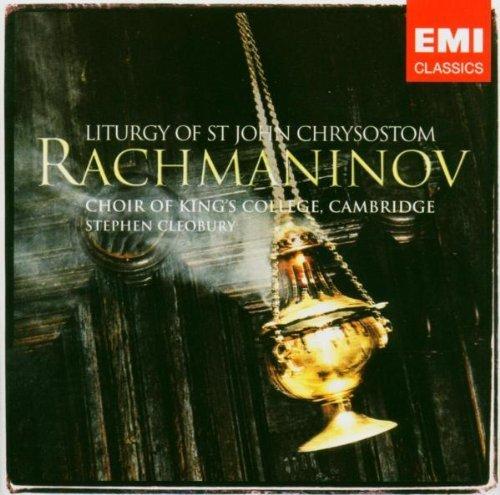Rachmaninov Liturgy of St John Chrysostom
King’s glorious return to the Russian Liturgy brings a foretaste of Paradise
View record and artist detailsRecord and Artist Details
Composer or Director: Sergey Rachmaninov
Genre:
Vocal
Label: EMI Classics
Magazine Review Date: 6/2004
Media Format: CD or Download
Media Runtime: 75
Mastering:
Stereo
DDD
Catalogue Number: 557677-2

Tracks:
| Composition | Artist Credit |
|---|---|
| Liturgy of St John Chrysostom |
Sergey Rachmaninov, Composer
King's College Choir, Cambridge Sergey Rachmaninov, Composer Stephen Cleobury, Conductor |
Author: Ivan Moody
Having recorded the much better known All-Night Vigil (‘Vespers’) in 1999, King’s here turn to Rachmaninov’s earlier setting of the Divine Liturgy (written in 1910), a work that is also now much better known in the West. I imagine that this recording may well consolidate its place in the repertoire, for it is, without a shadow of a doubt, a triumph.
The writing is, in general, sober in compar-ison with the Vigil, though there are unforgettable moments, such as the opening of the Second Antiphon which allows the crystalline tone of the boys to shine. In fact, the King’s choir make a virtue of an apparent limitation, producing an astounding choral blend in the simple responses of the litanies that punctuate the Liturgy: try the repeated ‘Poday Gospodi’s’ of the Litany of Supplication for a miracle of controlled power and sensitivity of timing.
The most famous section of the work is the lovely Lord’s Prayer, movingly sung here with fine attention to detail. Other sections, such as the Beatitudes ought also to attract the attention of any discerning choir director. Only in the Creed do the choir slightly lose the spring in their step; perhaps inevitable with such a lengthy setting in an unfamiliar language.
The cherry on the cake is the fact that the great majority of the priest’s and deacon’s intonations have been included (thankfully excluding the Words of Institution). This makes sense of the whole and proves, if it needed proving, that Rachmaninov knew all about liturgical pacing. This aspect of the recording benefits from the magnificent bass and fluent Slavonic of Protodeacon Peter Scorer, who, taking the deacon’s role, has the lion’s share. If Deacon Tobias Sims, singing the celebrant’s parts, cannot entirely disguise his English origins, the contrast between the two voices also helps to convey the liturgical feeling of the recording (pace those who would give it a wide birth because it’s both English and sung by boys!). There are excellent booklet-notes by Archimandrite Kyril Jenner.
There is, of course, no comparable rival to this disc; restricted to two versions, I would have this and a classic Russian account – Sveshnikov’s (Melodiya, nla) would be the ultimate contrast. But if I had only this recording on my desert island, I’d consider it a foretaste of Paradise.
The writing is, in general, sober in compar-ison with the Vigil, though there are unforgettable moments, such as the opening of the Second Antiphon which allows the crystalline tone of the boys to shine. In fact, the King’s choir make a virtue of an apparent limitation, producing an astounding choral blend in the simple responses of the litanies that punctuate the Liturgy: try the repeated ‘Poday Gospodi’s’ of the Litany of Supplication for a miracle of controlled power and sensitivity of timing.
The most famous section of the work is the lovely Lord’s Prayer, movingly sung here with fine attention to detail. Other sections, such as the Beatitudes ought also to attract the attention of any discerning choir director. Only in the Creed do the choir slightly lose the spring in their step; perhaps inevitable with such a lengthy setting in an unfamiliar language.
The cherry on the cake is the fact that the great majority of the priest’s and deacon’s intonations have been included (thankfully excluding the Words of Institution). This makes sense of the whole and proves, if it needed proving, that Rachmaninov knew all about liturgical pacing. This aspect of the recording benefits from the magnificent bass and fluent Slavonic of Protodeacon Peter Scorer, who, taking the deacon’s role, has the lion’s share. If Deacon Tobias Sims, singing the celebrant’s parts, cannot entirely disguise his English origins, the contrast between the two voices also helps to convey the liturgical feeling of the recording (pace those who would give it a wide birth because it’s both English and sung by boys!). There are excellent booklet-notes by Archimandrite Kyril Jenner.
There is, of course, no comparable rival to this disc; restricted to two versions, I would have this and a classic Russian account – Sveshnikov’s (Melodiya, nla) would be the ultimate contrast. But if I had only this recording on my desert island, I’d consider it a foretaste of Paradise.
Discover the world's largest classical music catalogue with Presto Music.

Gramophone Digital Club
- Digital Edition
- Digital Archive
- Reviews Database
- Full website access
From £8.75 / month
Subscribe
Gramophone Full Club
- Print Edition
- Digital Edition
- Digital Archive
- Reviews Database
- Full website access
From £11.00 / month
Subscribe
If you are a library, university or other organisation that would be interested in an institutional subscription to Gramophone please click here for further information.




